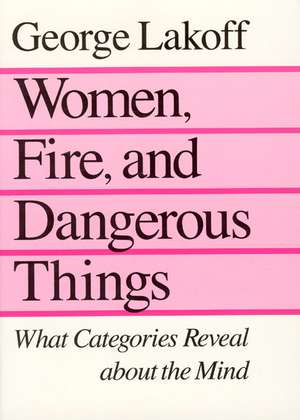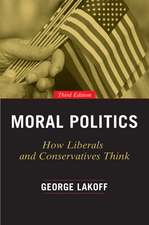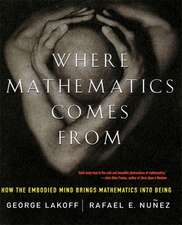Women, Fire, and Dangerous Things: What Categories Reveal about the Mind
Autor Professor George Lakoffen Limba Engleză Paperback – 15 apr 1990
"Its publication should be a major event for cognitive linguistics and should pose a major challenge for cognitive science. In addition, it should have repercussions in a variety of disciplines, ranging from anthropology and psychology to epistemology and the philosophy of science. . . . Lakoff asks: What do categories of language and thought reveal about the human mind? Offering both general theory and minute details, Lakoff shows that categories reveal a great deal."—David E. Leary, American Scientist
Preț: 191.68 lei
Nou
Puncte Express: 288
Preț estimativ în valută:
36.68€ • 39.97$ • 30.91£
36.68€ • 39.97$ • 30.91£
Carte disponibilă
Livrare economică 02-16 aprilie
Livrare express 18-22 martie pentru 89.69 lei
Preluare comenzi: 021 569.72.76
Specificații
ISBN-13: 9780226468044
ISBN-10: 0226468046
Pagini: 632
Ilustrații: 32 line drawings
Dimensiuni: 165 x 241 x 38 mm
Greutate: 1.1 kg
Ediția:1
Editura: University of Chicago Press
Colecția University of Chicago Press
Locul publicării:United States
ISBN-10: 0226468046
Pagini: 632
Ilustrații: 32 line drawings
Dimensiuni: 165 x 241 x 38 mm
Greutate: 1.1 kg
Ediția:1
Editura: University of Chicago Press
Colecția University of Chicago Press
Locul publicării:United States
Cuprins
Acknowledgments
Preface
Book I: The Mind beyond the Machine
Part I: Categories and Cognitive Models
1. The Importance of Categorization
2. From Wittgenstein to Rosch
3. Prototype Effects in Language
4. Idealized Cognitive Models
5. Metonymic Models
6. Radical Categories
7. Features, Stereotypes, and Defaults
8. More about Cognitive Models
9. Defenders of the Classical View
10. Review
Part II: Philosophical Implications
11. The Objectivist Paradigm
12. What's Wrong with Objectivist Metaphysics
13. What's Wrong with Objectivist Cognition
14. The Formalist Enterprise
15. Putnam's Theorem
16. A New Realism
17. Cognitive Semantics
18. Whorf and Relativism
19. The Mind-As-Machine Paradigm
20. Mathematics as a Cognitive Activity
21. Overview
Book II: Case Studies
Introduction
1. Anger
2. Over
3. There-Constructions
Afterword
References
Name Index
Subject Index
Preface
Book I: The Mind beyond the Machine
Part I: Categories and Cognitive Models
1. The Importance of Categorization
2. From Wittgenstein to Rosch
3. Prototype Effects in Language
4. Idealized Cognitive Models
5. Metonymic Models
6. Radical Categories
7. Features, Stereotypes, and Defaults
8. More about Cognitive Models
9. Defenders of the Classical View
10. Review
Part II: Philosophical Implications
11. The Objectivist Paradigm
12. What's Wrong with Objectivist Metaphysics
13. What's Wrong with Objectivist Cognition
14. The Formalist Enterprise
15. Putnam's Theorem
16. A New Realism
17. Cognitive Semantics
18. Whorf and Relativism
19. The Mind-As-Machine Paradigm
20. Mathematics as a Cognitive Activity
21. Overview
Book II: Case Studies
Introduction
1. Anger
2. Over
3. There-Constructions
Afterword
References
Name Index
Subject Index




















